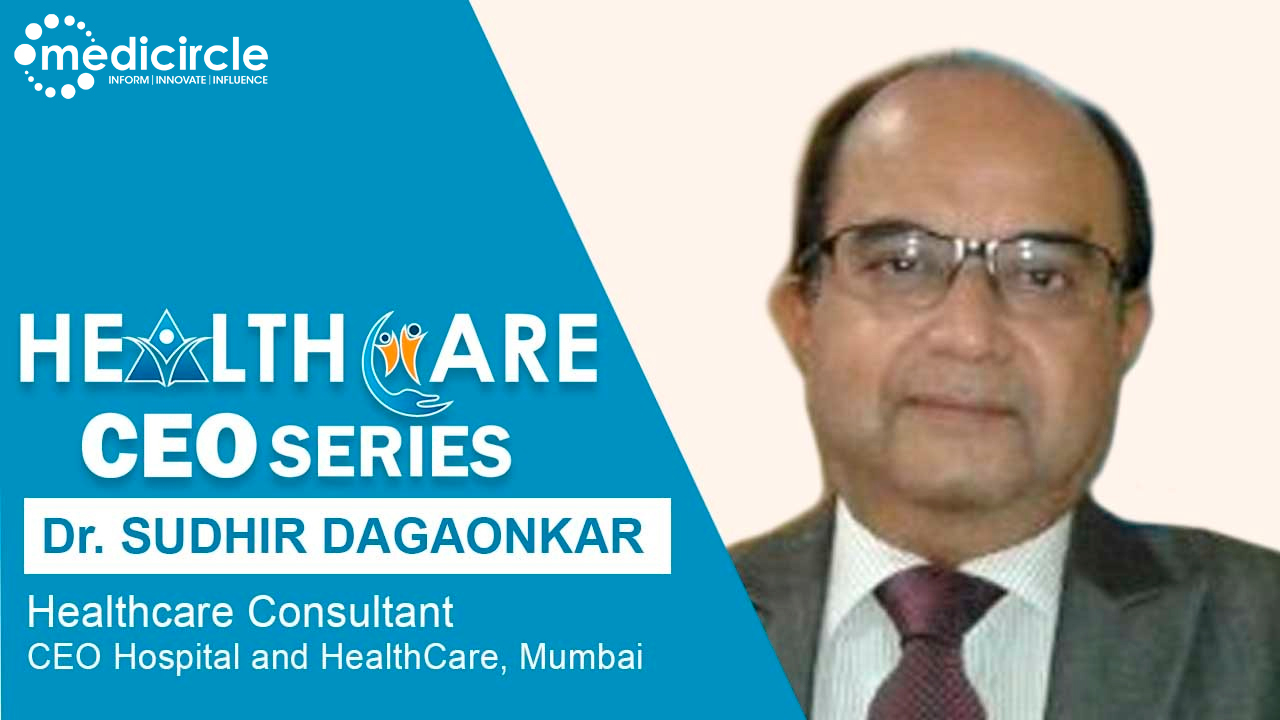After the global community was impacted severely by the coronavirus pandemic, the importance of healthcare and healthcare technology has been felt like never before. In recent years healthcare has become an integral part of the business ecosystem in India. While healthcare is itself a noble profession and majorly contributes to humanity, successful healthcare entrepreneurs are also making valuable contributions to the economies around the world. Medicircle presents to you the Top CEOs in the healthcare series, wherein we are featuring some Healthcare CEO's influential role models who are here to share their views about the future of the Indian healthcare ecosystem.
Dr. Sudhir Dagaonkar is a Consultant Physician in Clinical Pharmacology and Therapeutics. He is also into Clinical Research, Regulatory affairs, medical education, and Hospital management. He has got lots of experience.
Satisfactory journey
Talking about his journey Dr. Sudhir expresses, "My journey in the healthcare industry was very good. I am very proud that I am from Indore. I am among the first few candidates who have entered the medical line by competitive exams and it's been more than 50 years by now. I had come top 20 in states and top 10 in centers. I have seen many ups and downs in these years. After completing my MBBS from Indore, I came to Mumbai. It was my good luck that I got to work with some renowned good people. Working with such good people, my interest in knowledge also grew. I have worked with some good Pharmaceutical Industries also like IPCA Laboratories. After this I started my own Clinical Research Company, with this I was teaching pharmacology also. I have served 18 years as a member of the Maharashtra Medical Council and was Vice President too. I was always a part of the inspection team that visits colleges, universities, and hospitals. In these many years, I got to see the limitations of the government sector and capabilities of private sectors.”
Mumbai is the top choice for healthcare
Dr. Sudhir expresses, “I still believe that Mumbai should be one of the top choices for healthcare because of its utmost professionalism. I have worked with some big and best hospitals such as the Director of Lilavati Hospital and Chief Executive of Umrao Hospital. Working with such big names, my journey was very satisfactory. I have got a chance to travel internationally also. I adore Dr. BC Roy who had said, “You practice any pathy but show some sympathy towards a patient." As long as this feeling remains with the Indians, people here will care with utmost sympathy.”
Hospitals should be patient-centric and doctor friendly
Dr. Sudhir says, “During the 1970s the private healthcare sector was developing in Mumbai. Before this, for any kind of problems, everyone used to rush towards government hospitals. Slowly private sectors flourished. And then the private sector overtook the public sector hospitals. The hospitals should be patient-centric and doctor-friendly. Hospitals are nothing without doctors. We have mixed economies, those who want to get the treatment done in private, can go to private and those who want to visit public, can visit. It was the 90's when public sectors started getting faded. The management decisions should be in the doctor's hands and not in business-minded people. If it is in the doctor's hand, there will not be any dissatisfaction. It is very surprising but the social workers of hospitals are the most unsocial people. It is our duty we all should work together as a team towards a progressing future. A good doctor will never compromise on treatment quality whether it’s private or public.”
Government should increase funding for healthcare by twice or thrice
Dr. Sudhir points, “The GDP percentage for healthcare before 92 was quite good. We would not have faced many problems if the percentage would have been increased following the earlier budget. The government should increase this funding at least twice or thrice to meet the demands. People should demand this and the government should implement revised funding. They should not only be increasing facilities, but the government should also improve the support system.”
Technology + healthcare = Revolution
Dr. Sudhir speaks, “The future of healthcare is good because the younger generation of healthcare is much more brilliant than what we were. They will surely do good work if they will get the best quality education. The involvement of technology in healthcare has revolutionized the Indian healthcare ecosystem. These are helping patients by easing the convenience and giving better outcomes for patients. But in the future healthcare is going to be a joint decision between doctors and the patient. This will take some time but it will surely change for a better experience.”
Message to the medical aspirants
Dr. Sudhir advises, “If you are choosing medicine, then first give it a thought. You may have to face tough times, earnings will not be good in the initial days, and you won't be able to give time to yourself. Your future will depend on your efficiency. So, first, know your abilities, think 2-3 times before taking admissions. Take admission wisely and try to get admission to a good institute. All the best.”
(Edited by Renu Gupta)

 “Working in many different fields of healthcare, I have seen limitations of the government sector hospitals and capabilities of private sector hospitals too. Hospitals should be patient-centric and doctor-friendly. Government should increase funding in healthcare by twice or thrice,†says Dr. Sudhir Dagaonkar
“Working in many different fields of healthcare, I have seen limitations of the government sector hospitals and capabilities of private sector hospitals too. Hospitals should be patient-centric and doctor-friendly. Government should increase funding in healthcare by twice or thrice,†says Dr. Sudhir Dagaonkar






















.jpg)










